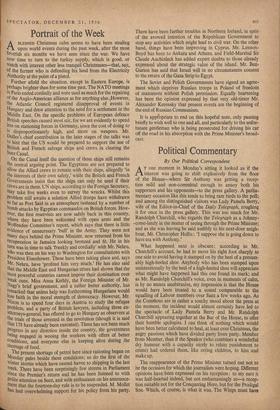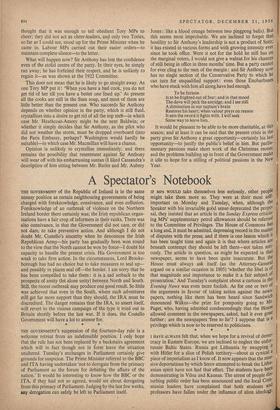Political Commentary
By Our Political Correspondent A T one moment in Monday's sitting it looked as if the PI interest was going to shift explosively from the floor of the House—where Sir Anthony was getting a recep- tion mild and non-committal enough to annoy both his supporters and his opponents—to the press gallery. A parlia- mentary occasion like this tends to bring rare birds to the poll; and among the distinguished visitors was Lady Pamela Berry, wife of the Editor-in-Chief of the Daily Telegraph, roughing it for once in the press gallery. This was too much for Mr. Randolph Churchill, who regards the Telegraph as a Johnny- -come-lately in the matter of seeing through the Prime Minister; and as she was leaving he said audibly to his next-door neigh- bour, Mr. Christopher Hollis: 'I suppose she is going down to have tea with Anthony.'
What happened next is obscure: according to Mr. Churchill's account, he had to move his right foot sharply to one side to avoid having it stamped on by the heel of a presum- ably high-heeled shoe. Anybody who has been stamped upon unintentionally by the heel of a high-heeled shoe will appreciate what might have happened had this one found its mark; and as Mr. Randolph Churchill's voice, even in moments of calm, is by no means unobtrusive, my impression is that the House would have been treated to a sound comparable to the squalling of Labour members over Suez a few weeks ago. As the Commons are in rather a touchy mood about the press at the moment, the incident would almost certainly have led to the spectacle of Lady Pamela Berry and Mr. Randolph Churchill appearing together at the Bar of the House, to offer their humble apologies. I can think of nothing which would have been better calculated to heal, at least over Christmas, the angry passions which have divided party from party. Member from Member, than if the Speaker (who combines a wonderful dry humour with a capacity nicely to relate punishment to crime) had ordered them, like erring children, to kiss and make up.
The reappearance of the Prime Minister turned out not to be the occasion for which the journalists were hoping. Different opinions have been expressed on his reception : to my ears it was half-hearted indeed. but not embarrassingly so—a recep- tion suitable not for the Conquering Hero, but for the Prodigal Son. Which, of course, is what it was. The Whips must have thought that it was enough to tell obedient Tory MPs to cheer; they did not act as cheer-leaders, and only two Tories, so far as I could see, stood up for the Prime Minister when he came in. Labour MPs carried out their easier orders—to maintain complete silence—to the letter.
What will happen now? Sir Anthony has lost the confidence even of the stolid centre of the party. In their eyes, he simply ran away; he has forfeited their respect, and he is unlikely to regain it—as was shown at the 1922 Committee.
This does not mean that he is likely to go straight away. As one Tory MP put it: 'When you have a bad cook, you do not get rid of her till you have a better one lined up.' At present all the cooks are still in the Suez soup, and most 'of them are little better than the present one. Who succeeds Sir Anthony depends on whether opinion in the party, which is still fluid, crystallises into a desire to get rid of all the top men—in which case Mr. Heathcoat-Amory might be the next Baldwin; or whether it simply decides that Sir Anthony, as the pilot who did not weather the storm, must be dropped overboard (into the Paris Embassy, perhaps? Washington would hardly be suitable)—in which case Mr. Macmillan will have a chance.
Opinion is unlikely to crystallise immediately; and there remains the possibility that resentment against Sir Anthony will wear off with his embarrassing suntan (1 liked Cassandra's description of him sitting between Mr. Butler and Mr. Aubrey Jones: like a blood orange between two pingpong balls). But this seems most improbable. We are inclined to forget that hostility to Sir Anthony's leadership is not a product of Suez; it has existed in various forms and with growing intensity ever since he took office. Were it not for the hold he still has on the marginal voters, I would not give a walnut for his chances of still being in office in three months' time. But a party cannot for ever cling to the men of the margin : and Sir Anthony now has no single section of the Conservative Party to which he can turn for unqualified support: even those Enobarbuses who have stuck with him all along have had enough.
To be furious Is to be frighted out of fear; and in that mood The dove will peck the estridge; and I see still A diminution in our captain's brain Restores his heart; when valour preys on reason It eats the sword it fights with. I will seek Some way to leave him.
It would be pleasant to be able to be more charitable, at this season; and at least it can be said that the present crisis in the party gives Sir Anthony a great opportunity—certainly his last opportunity—to justify the public's belief in him. But parlia' mentary passions make short work of the Christmas recess; and the problems building up in front of the Government make it idle to hope for a stilling of political passions in the New Year.



































 Previous page
Previous page